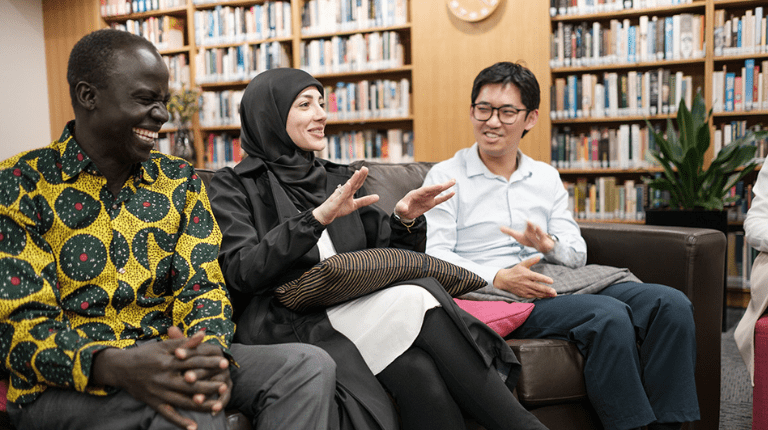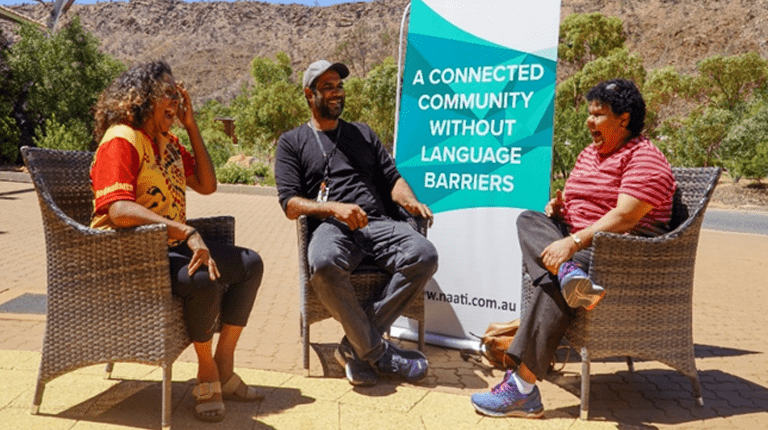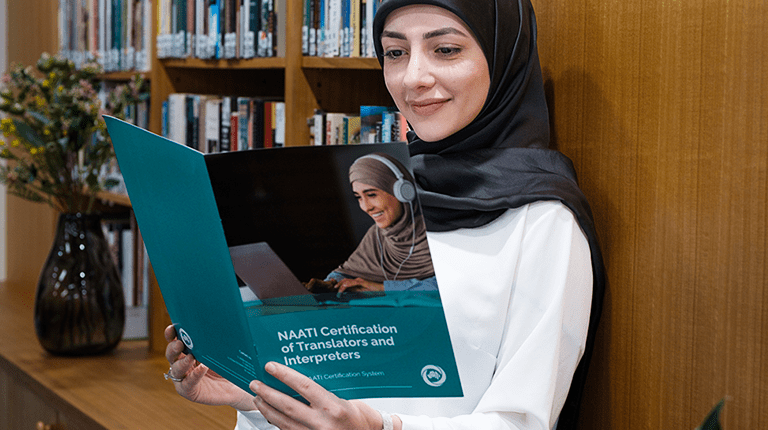NAATI is the national standards and certifying authority for translators and interpreters. It is a not-for-profit public company, owned by the governments of Australia.
We re-invest into the translating & interpreting profession, which you can read more about below. This includes our projects, supporting partners in delivering projects, and through direct engagement at relevant forums and conferences. We share updates about our engagement work on our LinkedIn channel.
Our projects

Continuous Improvement Program (CIP)
open
As part of its commitment to proactive continuous improvement, NAATI launched a Continuous Improvement Program (CIP) in March 2021.

Indigenous Interpreting Project (IIP)
open
Since 2012, NAATI has been funded by the Australian Government to develop the Indigenous interpreting industry in partnership with Indigenous organisations and improve the supply of certified interpreters in Aboriginal and Torres Strait Islander Languages.

Improvements to NAATI Testing (INT)
(Closed project)
In 2011, NAATI began a journey to raise our standards of testing and certification, leading to the development of the current Certification System. Read more about the research and outcomes here.
Our investment in the profession
Since 2018, NAATI has provided financial and in-kind support to projects being delivered by partners which address issues faced by the industry. We have a particular interest in ensuring the Certification System remains high quality and fit-for-purpose, as well as capability, capacity building and innovation across the profession.
Translation & interpreting technologies and their impact on the industry
Macquarie University | In progress.
The aim of the project will be to collect and analyse data on the status and trends regarding the use of digital technologies in the T&I industry, their impact on the professions and on the role(s) of translators and interpreters, the perceptions of professionals on such use. The research team will also provide recommendations on the possible effects of technology on the management of testing schemes.
WA Interpreter Scholarships
Office of Multicultural Interests and AUSIT | In progress.
To increase the pool of qualified and credentialed interpreters in Western Australia by providing scholarships for training, a free NAATI credential application and free AUSIT membership and professional development opportunities.
The MINDSET Study: Dementia training for interpreters: Supporting communication and assessment
National Ageing Research Institute | In progress.
This National Health and Medical Research Council Partnership Project will develop a workshop on interpreting health consultations with dementia patients and develop an online delivery platform for this workshop.
Click here to view the project website.
The Communicate Study – Transforming healthcare experience in northern Australia
Menzies School of Health Research | In progress.
This National Health and Medical Research Council Partnership Project will improve intercultural communication between Indigenous patients and healthcare providers in northern Australia, by increasing utilisation of Aboriginal interpreters in hospitals; improving the recruitment, retention and experience of interpreters and improving patient experience, health literacy and outcomes.
Deafblind communication and interpreting: Building professional competencies
Monash University | In progress.
This Australian Research Council Linkage Project will inform recommendations for developing training resources for deafblind interpreters and provide a foundation for skill set descriptions that could underpin a deafblind interpreting credential.
Judicial Officers’ communication strategies when working with court interpreters: Implications for access to justice
University of NSW | In progress.
This Australian Research Council Linkage Project aims to improve access to justice in criminal courts by producing evidence-based guidelines for judicial officers.
Optimising the availability and provision of Indigenous language interpreting in circuit courts
Monash University | In progress.
To investigate the availability of interpreters in NT circuit courts and discern the impact that the presence or absence of an interpreter has on the experience of Indigenous people engaging with the justice system.
Interpreting court hearing resources
Newcastle Women’s Domestic Violence Court Advocacy Service | Completed 2022-2023.
To develop recordings of interpreted audio/video court resources that inform women about court hearing procedures.
Translation of official documents: Ensuring quality and enhancing security
Western Sydney University | Completed 2021-2022.
To explore the views of translators, language services and end users about quality and integrity in the translation of personal documents and propose guidelines for this area of translation practice.
Professional development courses for interpreters working in family violence situations – Brisbane, Adelaide and Perth
Monash University | Completed 2019-2020.
To deliver a one day, face-to-face program in cities identified as having little or limited capacity for training for interpreters working in family violence settings.
Building capacity in the Auslan space
ASLIA | Completed 2020-2021.
To develop several short video clips on a range of topics, including ethics and vicarious trauma.
Identification of current gaps in professional development opportunities for translators and interpreters in Australia
Monash University | Completed 2020-2021.
To identify current gaps in professional development opportunities for translators and interpreters in Australia and provide recommendations to improve awareness, availability and access to PD events.
Development of four-unit skill set for use with Auslan language users
TAFE SA | Completed 2020-2021.
To develop several short video clips on a range of topics, including ethics and vicarious trauma.
Development of webinar regarding National Standards for Legal Interpreting
AUSIT | Completed 2020-2021.
To deliver a professional development webinar in two parts on the Judicial Council on Cultural Diversity’s (JCCD) Recommended National Standards for Working with Interpreters in Courts and Tribunals, promoting knowledge of the standards amongst court and tribunal interpreters.
Securing a Murrinh-Patha Interpreter Workforce
Aboriginal Interpreter Service (AIS) (Northern Territory) | Completed 2020-2021.
To offer a camp for young Murrinh-Patha speakers from the Wadeye Aboriginal community with the aim of delivering induction training and helping them develop a support network that will ultimately assist them to obtain NAATI certification. The AIS identified the need to create the pool of interpreters as Murrinh-Patha is one of the more common Aboriginal languages in the Northern Territory and Aboriginal people from the Wadeye community are one of the Aboriginal groups that are overrepresented in the Northern Territory criminal justice system.
Update to the Recommended National Standards for Working with Interpreters in Courts and Tribunals
Judicial Council on Cultural Diversity | Completed 2021-2022.
To review the Recommended National Standards for Working with Interpreters in Courts and Tribunals and include an awareness campaign.
Click here to view the second edition of the Recommended National Standards.
Effective public messaging in online communication for all Australians
Macquarie University | Completed 2021-2022.
To investigate accessibility, readability and translation of Australian public health messaging for second-language readers.
Queensland preparing interpreters project
AUSIT | Completed 2023.
To cover the full cost of the four-unit skill set for scholarship recipients in high-demand languages. Two scholarship rounds have been delivered with a total of 10 students.
Interpreter awareness training
ASLIA | Completed 2023.
To develop training sessions to educate the public and users of interpreting services on working with Auslan interpreters.
Click here to read more on the ASLIA website.
Useful links

About Us
NAATI is a public, not-for-profit company that is jointly owned by the Commonwealth, state and territory governments.


